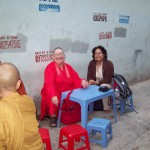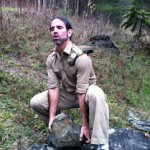Thursday
Buddhism, Psychedelic-Assisted Therapy and the Spiritual Path: An Interview with Dr. Sara Lewis
by Jillian Johnson
Register for the Buddhism, Psychedelic-Assisted Therapy and the Spiritual Path One-Day Retreat
One of the five main precepts in Buddhism is to avoid intoxicants, and it is clear that the use of substances can lead to spiritual bypassing. Yet many renowned practitioners in the West have talked openly about psychedelics as a catalyst to spiritual awakening that led them to the Dharma. Today, we sit down with Dr. Sara Lewis, co-founder of the Memoru Center for Visionary Healing Arts in Boulder, Colorado, and the Center for Psychedelic Studies at Naropa University, where she also served as an associate professor, and author of Spacious Minds: Trauma and Resilience in Tibetan Buddhism, to discuss the use of psychedelics in therapy and along one’s spiritual journey. In this interview, Sara provides us with her personal and professional perspective while considering how such practices may intersect, or not, with the Buddhist path.
Dr. Sara Lewis will hold an online mini-retreat, Buddhism, Psychedelic-Assisted Therapy and the Spiritual Path, through Shambhala Online on July 20, 2025. Click here to learn more and to register.
Jillian: Hi Dr. Lewis, thank you so much for being here with us today to share more about your work and knowledge in the field of psychotherapy and the implementation of psychedelics in mental health settings and spiritual pursuits.
Would you please tell us a little bit about your ‘why’ behind your work in mental health and how it expanded into the area of psychedelic-assisted therapy?
Dr. Lewis: I have long been interested in the mind: concepts of mind, the beauty and the challenges of the mind, and what it means to be human. As an anthropologist of religion and a psychotherapist, I am also deeply interested in how our connection to the divine changes across culture. In one way or another, I have been involved in the field of psychedelic studies for the last twenty years, yet it is more recent that psychedelic therapy has become more mainstream. As a Buddhist, I continue to see my clinical work as a skillful means to work with suffering in the world.
Jillian: How fascinating. We heard you opened a new clinic? Congratulations and please tell us more!
Dr. Lewis: Yes! Memoru Center for Visionary Healing Arts is a contemplative-based psychedelic training institute and community clinic where we offer legal psychedelic therapy. We can accept out of state clients who wish to travel to Colorado for a psilocybin experience. The Memoru clinic has a strong connection to Naropa University, where most of the cofounders have either worked as faculty or completed their studies.
Jillian: That’s very exciting, congratulations again! Speaking of legal psychedelic therapy, what do you feel are the current social and political climates surrounding the utilization of substances (primarily psilocybin and MDMA) in controlled mental health and spiritual settings? Are you noticing more or less acceptance in your typical day-to-day professional and personal interactions than in recent years?
Dr. Lewis: In general, there is a lot of interest and excitement for the therapeutic use of psychedelics. Many people understand that among veterans, abuse survivors, and others with PTSD, our standard treatments often fall short. As well, there is deep potential for plant medicines and psychedelics for those navigating the end of life. At Memoru, we will have a family program that aims to work with entire families–this might be when one person is at the end-of-life, navigating the post-partum period after birth, couples work, or a veteran returning home. When psychedelic care is done in a way that is slow, intentional and safe, I think there is significant support. At the same time, our basic health care infrastructure is not really set up to easily make this type of work accessible. Psychedelics do not fit easily into a capitalist system and without sounding too conspiratorial, the global Big Pharma system has many reasons to hinder the kind of paradigm shift many of us interested in psychedelic-assisted therapy are hoping for. Still, I believe that most of us yearn for change. With psilocybin now legal in various capacities in Oregon, Colorado and most recently, New Mexico, I believe in the next 5-10 years we will see a significant shift in accessibility of these modalities in North America and around the globe.
Jillian: Thank you so much for this thoughtful response, Sara. It is comforting to know that all areas of support are being explored for those seeking treatment and their families. Do you feel momentum and public support will eventually result in the integration of psychedelics into mainstream healthcare?
Dr. Lewis: Absolutely. And this could go the other direction as well if we do not take seriously the ethical responsibility to work with these medicines in a safe way. Many cultures across the world understand plant medicines to be living beings with sentience. They shouldn’t be “taken” in an extractive way. If we can relate with the cultures ethically who are stewards of these medicines, and collaborate and learn from them, I think we may have good results. For society as a whole to open up to them, I think we are in a critical period of needing to demonstrate that as a human society we can be trusted with these powerful agents. It’s up to us! But I feel the plants and fungi also want to help.
Jillian: I love your statement “…I feel the pants and fungi also want to help” and the care you show towards our Plantae and Fungi kingdoms. Have you noticed an increase in the number of patients and clients willing to consider psychedelics as part of their treatment plan for depression, anxiety, addiction, PTSD, etc.?
Dr. Lewis: Yes, very much so. Many people have earnestly tried conventional therapies without much relief. There are also many people seeking to work with suffering within the human condition in a way that honors and deepens their spiritual path. So there’s sort of a question about whether the work is “mental health work,” “spiritual work,” or something else. There is also a lot of joy, beauty and connection, something that may not be fully honored in a traditional treatment plan that tends to focus rather narrowly on the eradication of symptoms.
Jillian: It sounds like a very integrative approach that is catered to each individual’s unique needs and requirements, which is still lacking in many areas of healthcare. Would you tell us more about a situation(s) where the assistance of psychedelics, in a therapeutic application, aided a client in a breakthrough (mental, emotional and/or spiritual) that may not have occurred, or may have taken longer to occur, with more traditional mental health practices? Are you able to expand on the experience, at least from your perspective, and how that felt?
Dr. Lewis: I have had so many clients with intergenerational and ancestral experiences, even when they weren’t necessarily seeking that out. This has looked like deeply experiencing and seeing the ways that an ancestral burden has been passed down through the ages, visitations from elders who have passed, and sometimes a deep experience of connection and homecoming into one’s ancestral lineage. This happens so frequently that I myself, have embarked on a formal process of Ancestral Lineage Healing over the past year to better learn to work with my own spiritual lines. We will have more on this in the mini-retreat!
Jillian: This sounds not only incredibly interesting, but heart-warming as well. What a beautiful experience for both you and your clients. I am intrigued to hear more at the mini-retreat! In which situation(s) do you recommend someone not take psychedelics or partake in psychedelic-assisted therapy if it is a path they are interested in pursuing for their mental health and/or spiritual journey?
Dr. Lewis: These agents can be very powerful and it’s important to know if it’s the right time. I receive many referrals for people who have had negative even traumatic experiences resulting from psychedelics. Beyond contraindicated conditions like psychosis and mania (though even those who have these histories may be able to work in psychedelics under certain conditions), I wouldn’t recommend jumping into working with them if things aren’t stable enough to be able to accommodate potentially big and sometimes disruptive shifts. Sometimes these medicines work through disruption and dissolving: this could be to harmful patterns, misperceptions, ego-clinging, itself, or even the dissolving of relationships, career or other major disruptions.
Jillian: This is a very strong point to consider. Thank you for mentioning ‘being ready’ for shifts. While it is often said “The only constant change,” it is important to remember to be as grounded as possible before inviting a powerful catalyst for said change. What would you recommend as some of the “should” and “should nots” before holding a psychedelic session in terms of choosing an appropriate environment, monitoring one’s current mental state, integrating other practitioners and/or professionals, etc.? In a sense, what would you recommend in terms of setting yourself up for an enlightening experience?
Dr. Lewis: Most people do not need to work with a psychedelic therapist or clinician to have a safe and meaningful experience. This was recognized in the state of Colorado that has approved personal use of psilocybin mushrooms for anyone 21 years and over. Colorado also allows for individuals to embark on training as facilitators who do not hold a clinical license, again recognizing that many people can be trained to hold space for someone else ethically and with care. However, if the intention is really to engage in therapeutic work, it would be important to seek out a trained and licensed clinician. Sometimes it can be hard to really discern whether the work is “therapeutic” or whether it is “spiritual.” But this isn’t a new problem. Many cultures around the world do not separate the paths of healing and spirituality. What is most important is to feel that the setting and the practitioner is slow, intentional, and rooted in some kind of practice lineage. I would not get involved with anyone who doesn’t seem to have any mentors, elders, or community of accountability.
Jillian: Very true, consistent and quality integrative care that takes into account physical, mental, spiritual, and emotional health of an individual is a hurdle that seems to continually appear, at least in American culture. On a more casual note, if you were talking freely (perhaps in a bar) to a captivated audience, what would your elevator pitch be when introducing a metaphysical discussion on the topic of psychedelics in therapy or on one’s spiritual journey?
Dr. Lewis: I probably wouldn’t make one. A person really needs to feel the call, so to speak, on their own! If you listen and hear the call, however, many of us all across the globe would love nothing more than to dive into that conversation!
Jillian: What a conscientious approach. Wait for the invitation. And now for our final interview question, what has the use of psychedelics done for your personal spiritual growth? Do you have any stories you’re willing to share with us?
Dr. Lewis: Yes, but I will save these for the mini-retreat. Hope you can join!
Thank you, Sara, we’re looking forward to it! Myself and Shambhala Online thank you for taking the time to answer our questions about these exciting advances in patient/client care. You have touched on many dynamic aspects regarding the use of psychedelics in client care and we are eager to dive deeper on July 20!
Dr. Sara Lewis is Co-founder of Memoru Center for Visionary Healing Arts, a psychedelic clinic and training institute in Boulder, Colorado. She served as Associate Professor at Naropa University in Buddhist-Informed Counseling, where she also co-founded the Center for Psychedelic Studies. Sara is author of Spacious Minds: Trauma and Resilience in Tibetan Buddhism, an ethnographic study of mind, memory and recovery from collective trauma in the Tibetan exile community. She teaches in Shambhala on the topic of Buddhism and psychedelics, and has also served in a number of leadership roles, including a term on the Interim Shambhala Board.
Entries filed under Community Articles
Finding Balance: On the Cushion and Off – HIGHLIGHT
An Interview with Hope Martin by Debra Hiers Hope Martin will be leading a weekthun in Atlanta April 22-28, 2012 teaching the principles discussed in the interview below to intensive meditation practice. I take my seat on the cushion, settle into my sit bones. Hands resting ... continuePosted April 18, 2012 by
Checking In From the Mukpo Institute @ Karme Choling – HIGHLIGHT
by Lawrence Jordan, Mukpo Institute student at Karme Choling This note originally went out to the mailing list of my home Sangha. I would like to extend it out to the entire Shambhala community. I’m sorry I haven’t had the opportunity to write sooner, but my days ... continuePosted April 17, 2012 by
Celebrating Warriors in the World – HIGHLIGHT
When we as Shambhalians highlight and celebrate warriors in the world, we are reminded that the tradition of warriorship is timeless. In this article by Shastri Charlene Leung, Chairperson of the Shambhala Diversity Working Group, we look through a window at Shambhala community events that are ... continuePosted April 16, 2012 by
Reflection on Warriorship and Enlightened Society
by Susmita Barua The goal of warriorship is to express basic goodness in its most complete, fresh and brilliant form. As warriors, we train ourselves to rest in basic goodness, in a state of complete simplicity. What the warrior renounces is anything that is a barrier between ... continuePosted April 12, 2012 by mita
Reflections from the United Nations Headquarters
Reflections on the “High Level Meeting on Wellbeing and Happiness: Defining a New Economic Paradigm” at the United Nations Headquarters, April 2, 2012 by Bob Gailey I walked down First Avenue on a sunny spring morning and saw the line forming to enter the visitors gate on the ... continuePosted April 12, 2012 by
Acharya Dale Asrael Reviews the New Book – HIGHLIGHT
Letter to the Shambhala community from Acharya Dale Asrael, in anticipation of the forthcoming book by the Sakyong I have just finished reading an advance copy of the Sakyong’s new book, Running with the Mind of Meditation, and I feel excited about the potential it holds. This ... continuePosted April 8, 2012 by
On Aging: Let Things Flow – HIGHLIGHT
The wisdom of Ann Cason article by David Whitehorn This is the third in an ongoing series of articles on Aging in Shambhala. The first consisted of remarks by Sakyong Mipham Rinpoche on aging (click here), the second examined a Shambhala ‘Statement on Aging’ (click here). This ... continuePosted March 14, 2012 by
Rigdens at an Exhibition | Shambhala Times Community News Magazine
Rigdens at an Exhibition | Shambhala Times Community News Magazine. From: Pioneer Valley Shambhala News continuePosted March 13, 2012 by
Rigdens at an Exhibition – HIGHLIGHT
by Dan Glenn, Director of the Shambhala Meditation Center of Boston The Boston Museum of Fine Arts opened its exhibit, Seeking Shambhala early last Monday morning. The exhibition features a set of newly-conserved 17th century thangka paintings of the Rigden (or Kalki) Kings of Shambhala and is ... continuePosted March 12, 2012 by
Celebrating the Lineage of Milarepa – HIGHLIGHT
Today is Milarepa Day! On the first full moon of the New Year we celebrate the enlightenment and life example of Milarepa by reading the songs of the lineage fathers in The Rain of Wisdom. This text consists of stories of the great meditators of the ... continuePosted March 7, 2012 by
Shambhala 2011 The Year in Review movie closed captioned in eight languages
The wonderful Shambhala 2011 Year in Review movie was captioned and translated into eight languages thanks to the valiant efforts of many translators who worked tirelessly to have the translations ready for Shambhala Day. Thanks to their efforts may more Shambhalians were able to see the ... continuePosted February 28, 2012 by Hamish_MacLaren
Working with Obstacles – Dön Season – HIGHLIGHT
article by Pablo Coddou, Kado Rusung at Karme Choling If you have been around the Shambhala community in the earlier part of any year, you likely have heard talk about Dön Season (pronounce the ‘ö,’ like ‘could’). This is the period of time that leads up to the ... continuePosted February 18, 2012 by
Heart Advice for Creating Enlightened Society
photos and article by Sean Raggett The reality is that we can’t handle our anger, we can’t develop our patience and we can’t cultivate our wisdom without working with others. ~ Sakyong Mipham Rinpoche During the weekend of 14-15 January, the President of Shambhala, Richard Reoch, led ... continuePosted February 14, 2012 by
Valentine Flowers – Ikebana Style – HIGHLIGHT
by Karme Choling blogger, Anne-Marie Keppel Don’t order flowers for your loved one this Valentine’s Day. Instead, make your gift more intimate by creating an Ikebana arrangement! Ikebana, traditional Japanese flower arrangement, has its origins in the Shinto tradition where arrangements are a part of shrine ... continuePosted February 14, 2012 by
Appeasing the Mamos – HIGHLIGHT
by Shambhala Times Regional Correspondent Travis May Yesterday I sat down for an early dinner with my meditation instructor, the world-famous Shambhalian Will Ryken, after a nice two hour practice session at our center in St. Petersburg, Florida. As one of the original Dorje Kasung (and recently ... continuePosted February 13, 2012 by Travis_May
![]() RSS feed for the Community Articles category
RSS feed for the Community Articles category
View all posts from authors in Community Articles: jillian_johnson























